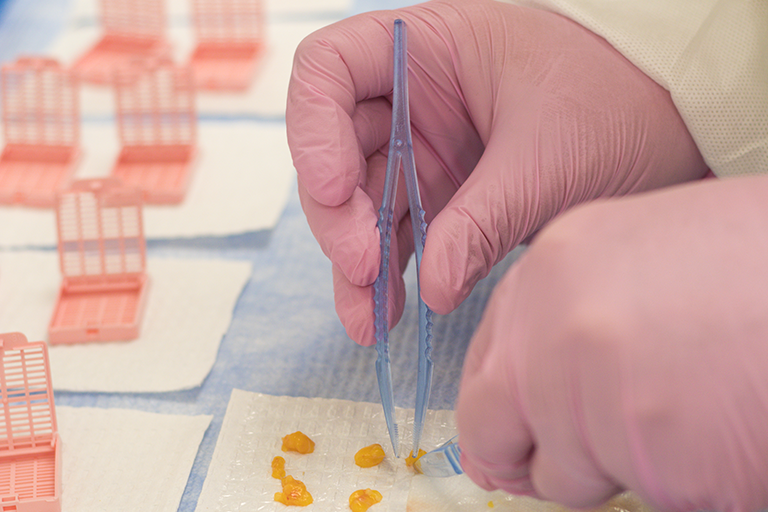Over the last decade, breast cancer rates have risen for African American women, who suffer a 40 percent higher breast cancer mortality than white women. Despite this burden, African American women are under-represented in research examining breast cancer risk.
Researchers wanted to look at breast tissue from African American women to better understand this disparity. They already knew that tissue-based markers are ideal to develop risk models because these markers reflect variables such as genetics, behavioral factors, and environment.
For this study, researchers used tissue from breast biopsies of African American women as well as “normal” tissue from African American women at the Komen Tissue Bank. The “normal” tissue from KTB is unique because donors’ tissue was not collected from medical procedures but rather from volunteers contributing their healthy tissue to the bank.
Inflammation Markers on Benign Breast Biopsy are Associated with Risk of Invasive Breast Cancer in African American Women
What did they study?
The scientists assessed biopsies from African American women from three groups: cancer-free women who donated normal tissue to the KTB; women who had biopsies that found benign breast disease; and women who had biopsies that found breast cancer.
Under the microscope, they looked for two markers associated with breast cancer risk: crown-like structures and infiltrating lymphocytes. These have not been well-described in normal tissue, so researchers wanted to see if those showed up in KTB samples as well as in the benign breast disease and/or the cancer biopsies.
What did they find?
The study found that the crown-like structures and the infiltrating lymphocytes are common in benign breast tissue and are associated with risk of breast cancer in African American women.
The data suggests these are biomarkers for breast cancer risk among women with benign breast disease and may shed light on early formation of breast cancer. These markers may be used to estimate risk of breast cancer for women with benign breast disease, who already are at increased risk compared to women who have never had a breast biopsy.

Why is this study important?
Refining our understanding of breast cancer risk will allow doctors to personalize screening and prevention efforts. As more studies point to race-specific nuances at the tissue level, using markers to establish risk means tailoring preventive care to each patient.
Full citation
Shaik AN, Kiavash K, Stark K, Boerner JL, Ruterbusch JJ, Deirawan H, Bandyopadhyay S, Ali-Fehmi R, Dyson G, Cote ML. Inflammation markers on benign breast biopsy are associated with risk of invasive breast cancer in African American women. Breast Cancer Res Treat. 2021 Feb;185(3):831-839. doi: 10.1007/s10549-020-05983-x. Epub 2020 Oct 28. PMID: 33113091.




